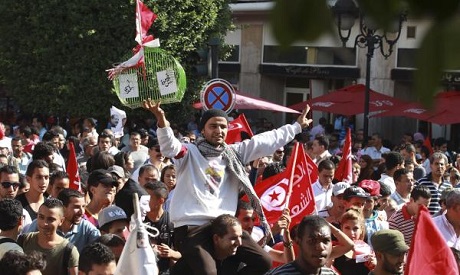
Protesters shout slogans during a demonstration to call for the departure of the Islamist-led ruling coalition in Avenue Habib-Bourguiba in central Tunis October 23, 2013 (Photo: Reuters)
Tunisia's Islamist premier Ali Larayedh made a written pledge to step down in a last-ditch bid to rescue crisis talks on Friday that the opposition was threatening to boycott.
The national dialogue aims to end months of political deadlock between the government and the mainly secular opposition that has paralysed Tunisia's political transition nearly three years after the January 2011 overthrow of veteran strongman Zine El Abidine Ben Ali.
Amid growing doubts that the opposition would attend a new attempt to launch the negotiations on Friday, Prime Minister Ali Larayedh sent a written commitment to mediators that his government would resign, his ruling Islamist party Ennahda said.
The pledge drew a positive initial reaction from opposition members, although an official reaction had yet to be announced.
Fadhel Mahfoudh, president of the bar association that is helping mediate the crisis, said he thought the national dialogue could begin later on Friday following a delay of several hours.
Earlier efforts to launch the talks on October 5 and 23 failed, most recently after a statement by Larayedh failed to satisfy opposition demands.
"Last night on television, Tunisia's prime minister reiterated his government's pledge to step down according to the quartet roadmap, following the implementation of the preceding milestones in the roadmap," Ennahda said on Friday.
"A signed statement of the same pledge has been sent to the quartet hosting the national dialogue."
The opposition has previously refused to join the talks until Larayedh gives a "clear and explicit" undertaking that his government will step down within three weeks of the dialogue's launch.
"Personally speaking, I think the written commitment responds to the expectations of (opposition coalition) the National Salvation Front and the dialogue should be able to start," Mongi Ellouze, a member of the opposition tasked with examining Larayedh's latest proposal, told AFP.
One major opposition faction, the Nidaa Tounes party of ex-premier Beji Caid Essebsi, an outspoken Ennahda critic, had said only a written committment to the three-week deadline from the government would persuade it to join the dialogue.
The timeframe is stipulated in the hard-won roadmap brokered by the mediators between the government and the opposition, at the end of which a caretaker cabinet of technocrats is to be appointed.
The blueprint also sets a parallel one-month timeframe for the adoption of a new constitution and electoral laws, and a timetable for fresh elections, which the government is insisting must also be adhered to.
Bitter divisions between the Ennahda-led government and its secular opponents have blocked progress on those key political issues, hampering Tunisia's democratic transition.
The heightened political uncertainty comes amid a tense security situation in Tunisia which was still marking three days of national mourning for six policemen killed in a clash with suspected militants in the central Sidi Bouzid region on Wednesday.
The country has been rocked by violence blamed on jihadist groups suppressed under Ben Ali.
Early on Friday morning, police shot and wounded a suspected militant after a car chase in a Tunis suburb, but the interior ministry later said that those travelling in the car were "drunken youths" with no links to terrorism.
Public anger has been mounting over the death toll from jihadist violence, which saw two Ennahda offices torched on Thursday as seven slain police officers were laid to rest.
The failure of the government to rein in militants has been one of the principal grievances of the opposition, which has boycotted work on drawing up a new constitution since the killing of one its MPs by suspected jihadists in July.
The government has admitted it has struggled to contain the militants but blamed a lack of resources.
Short link: